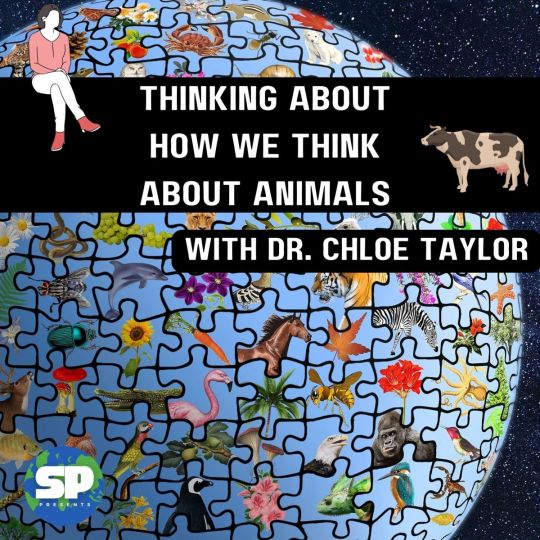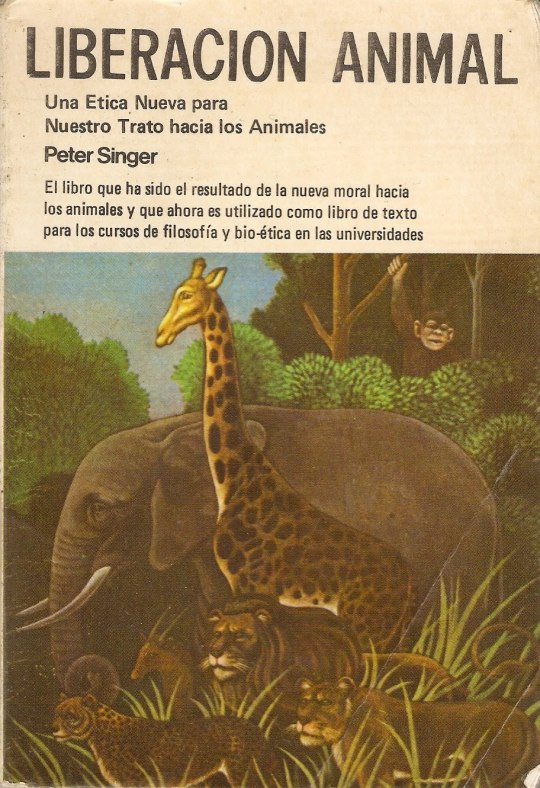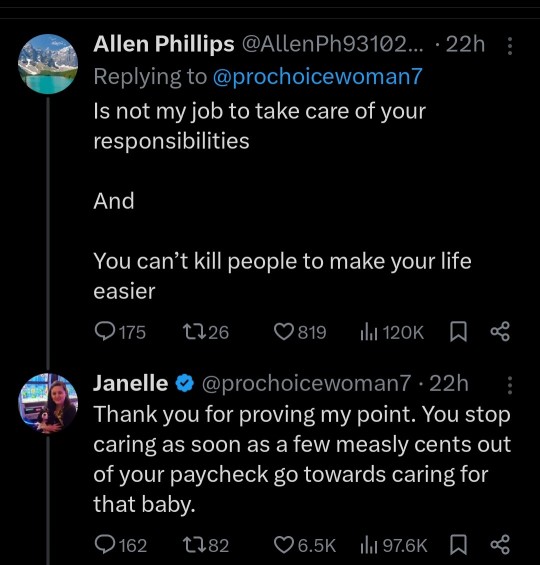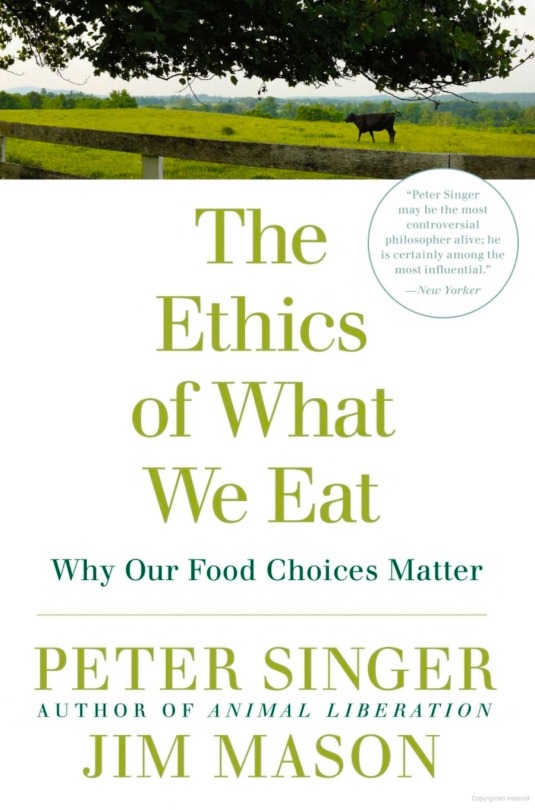#Peter singer
Explore tagged Tumblr posts
Text
Whenever a disabled person's post on vegan ableism gets any popularity you find the same responses from angry vegans.
"Um, actually, veganism is about harm reduction. So you can be vegan and eat meat if you need to. Please educate yourself because you are being veganphobic right now."
"I smelled someone with your stated disability once so I know you are lying about having it to further your anti-vegan agenda!"
"No person needs to eat meat or use animal-based products. Stop lying!"
"Nature is important so if you must eat meat or use animal-based products to live, you should just die."
"Veganism does not have an ableism problem. You only think that because you listen to That Vegaon Teacher, Vegan Art Book, and other cringy vegans while ignoring upstanding vegan activists. Like Peter Singer."
149 notes
·
View notes
Photo

Legally Blonde 2: Red, White & Blonde (2003) by Charles Herman-Wurmfeld
Book title
Animal Liberation (1975) by Peter Singer
Living in Harmony with Animals (2000) by Carla Bennett
Constitution, Jefferson’s Manual, and the Rules of the House of Representatives
Food Drug and Cosmetic Act: A Practical Guide to Law & Regulation
Animal Testing Question: Alternatives & Analyses
History of the FDA
#legally blonde 2 red white & blonde#charles herman-wurmfeld#books in movies#animal liberation#peter singer#living in harmony with animals#carla bennett#constitution jefferson's manual and the rules of the house of representatives#food drug and cosmetic act a practical guide to law & regulation#animal testing questions alternatives & analyses#history of the fda
54 notes
·
View notes
Text
We have to speak up on behalf of those who cannot speak for themselves.
Peter Singer, 'Animal Liberation', 1975.
62 notes
·
View notes
Text

Saturn Devouring His Son by Fancisco Goya is a piece considered to be the reflection of Goya's disillusionment of mankind. One common cause for such of disillusionment in many people is a disagreement in ethics with those who populate physical and virtual landscapes alike. However, when was the last time you were critical of your own ethics? In addition to this popular painting, I want to present an equally popular argument by Peter Singer: it is a moral obligation to donate surplus to charity. It is immoral to not give to charity. In his argument, he presents the 'drowning child' thought experiment. If you come across a child drowning in water that you can wade through, are you morally obligated to save the child at the cost of ruining your own clothing and being late for work? Most would say "yes, of course." Singer claims this experiment exemplifies the neglect shown by the average person, specifically a callousness towards the needs of others. To make the concept brief and paraphrased: for as low as $5 USD, you could contribute to literally saving lives, especially children in poor African nations. Five dollars. Really think about that. Ordering food, buying nice clothes, buying decorative items, buying a smart phone, buying video games, the value of all of these things could potentially save dozens or hundreds of lives.
How many lives could you, individually, have saved with all the surplus money you put into luxuries? If you are to be disillusioned by Man through your criticisms of others, remember that you need not look further than yourself for that disillusionment. Shame is deserved for all of us.
#existentialism#misanthropy#despair#dark#peter singer#morality#ethics#poverty#charity#philosophy#insert tag here that makes me feel pretentious
2 notes
·
View notes
Text


Jérôme Lejeune (left) and Peter Singer (right)
Similarly, the preference utilitarian reason for respecting the life of a person cannot apply to a newborn baby. Newborn babies cannot see themselves as beings who might or might not have a future, and so cannot have a desire to continue living. For the same reason, if a right to life must be based on the capacity to want to go on living, or on the ability to see oneself as a continuing mental subject, a newborn baby cannot have a right to life. Finally, a newborn baby is not an autonomous being, capable of making choices, and so to kill a newborn baby cannot violate the respect for autonomy.
Peter Singer
We need to be clear: the quality of a civilization can be measured by the respect it has for its weakest members. There is no other criterion.
Jérôme Lejeune
First, while there has been a growing awareness of human dignity, many misunderstandings of the concept still distort its meaning. Some people propose that it is better to use the expression "personal dignity" (and the rights "of the person") instead of "human dignity" (and the rights "of man") since they understand a "person" to be only "one who is capable of reasoning." They then argue that dignity and rights are deduced from the individual's capacity for knowledge and freedom, which not all humans possess. Thus, according to them, the unborn child would not have personal dignity, nor would the older person who is dependent upon others, nor would an individual with mental disabilities. On the contrary, the Church insists that the dignity of every human person, because it is intrinsic, remains "in all circumstances." The recognition of this dignity cannot be contingent upon a judgment about a person's ability to understand and act freely; otherwise, it would not be inherent in the person, independent of the individual's situation, and thus deserving unconditional respect. Only by recognizing an intrinsic and inalienable dignity in every human being can we guarantee a secure and inviolable foundation for that quality. Without any ontological grounding, the recognition of human dignity would vacillate at the mercy of varying and arbitrary judgments. The only prerequisite for speaking about the dignity inherent in a person is their membership in the human species, whereby "the rights of the person are the rights of man."
Dignitas Infinita, or "On Human Dignity" (§24)
#Catholicism#Christianity#humanity#personhood#human dignity#Dignitas infinita#Peter Singer#Jerome Lejeune#philosophy#prolife#disability#euthanasia#abortion#ableism#infanticide
7 notes
·
View notes
Text

Write the first draft of your papers in purple.
#aesthetic#study blog#study aesthetic#purple#purple aesthetic#essay#peter singer#is based actually#student life#university
2 notes
·
View notes
Text
I think my fellow utilitarians need to read Cullity's "Asking Too Much". Like, I for sure get why it's tempting to think that we need to be spending as much of our time as we can helping those less fortunate than us, but we need to keep ourselves fulfilled, too.
And this isn't just egoism. Cullity makes a very strong point.
2 notes
·
View notes
Text
*Starts asking Peter Singer about the ethics of eating sessile and non-sessile mollusks, trying to gauge whether and when he recognizes that I've slipped into directly quoting Crassus's "oysters and snails" bisexuality dialog from Kubrick's Spartacus.*
2 notes
·
View notes
Text
3.2: Thinking About How We Think About Animals with Dr Chloë Taylor
Today’s episode is all about animal ethics—or do we mean critical animal studies? @arielkroon discusses this linguistic nuance and the differences between them (and much, much more!) with Dr Chloë Taylor, professor of women and gender studies at University of Alberta.
Today’s episode is all about animal ethics—or do we mean critical animal studies? Ariel discusses this linguistic nuance and the difference between them (and much, much more!) with Dr Chloë Taylor, professor of women and gender studies at the University of Alberta. Dr Taylor has been involved in a five-year-long project researching the “Intersections of Animality” and is a trained philosopher who works in gender studies, and sees a lot of intersections between the way that we think about and treat animals and the way that we think about and treat minoritized subjects. Come join us for a thought-provoking and highly educational discussion here!
Links
Dr Chloë Taylor’s profile at University of Alberta
Peter Singer and Tom Regan
North American Association for Critical Animal Studies
Where Disability Rights and Animal Rights Meet: A Conversation with Sunaura Taylor
Making Kin: An Interview with Donna Haraway
Auroch de-extinction and rewilding
Connect with Solarpunk Presents Podcast on Twitter, Mastodon, or at our blog.
Connect with Ariel at her blog, on Twitter at @arielletje, and on Mastodon.
Connect with Christina at her blog, on Twitter, and on Mastodon
Support the show on Patreon or make a one-time donation via PayPal.

View On WordPress
#animal ethics#animal rights#Chloe Taylor#critical animal studies#definitions of humanity#disability rights#Donna Haraway#hope#Peter Singer#solarpunk#Sunaura Taylor#theory#Tom Regan#University of Alberta#veganism#podcast#episode#podcasting
4 notes
·
View notes
Text
Utilitarianism and Physicalism
Ever thought about how you know whether you could add utility? Can you actually compare how good two things actually are? The answer may depend on what exactly you think consciousness is. For a deeper discussion on the topic, read here. Criticism welcome!
#utilitarianism#Robert Nozick#Physicalism#peter singer#philosophy#blog#amature#mind body connection#Epiphenomenalism#morality#ethics
2 notes
·
View notes
Photo

Este libro de Peter Singer es una lectura imprescindible para conocer la trayectoria de la filosofía y el movimiento animalista. Esto no significa que uno tenga que estar de acuerdo con todos los postulados y conclusiones que se exponen en él. De hecho, si adoptamos un enfoque vegano abolicionista entonces es imposible no estar en desacuerdo con ellos: https://filosofiavegana.blogspot.com/2013/04/liberacion-animal.html
2 notes
·
View notes
Text

Peter Singer would sooner donate a kidney than sponsor a concert hall. So when entertainment mogul David Geffen gave $100 million in early March for the renovation of Avery Fisher Hall at Lincoln Center in New York—it will soon be renamed David Geffen Hall—Mr. Singer questioned why people thought he was doing so much good.
Over Skype from his home in Melbourne, Australia, Mr. Singer says that he doesn’t understand “how anyone could think that giving to the renovation of a concert hall that could impact the lives of generally well-off people living in Manhattan and well-off tourists that come to New York could be the best thing that you could do with $100 million.” He notes, for example, that a donation of less than $100 could restore sight to someone who is blind. Mr. Geffen declined to comment.
In his new book, “The Most Good You Can Do,” to be released on Tuesday, Mr. Singer argues that people should give a substantial percentage���ideally a third—of their income to charities. Mr. Singer himself has given away at least 10% of his income for 40 years; that number has gradually risen to between a quarter and a third of his income. He advocates focusing donations on the developing world. Once the world’s more basic needs have been met, he says, “then help people listen to concerts in beautiful concert halls.”
It’s a controversial way to encourage philanthropy. Some critics find it uncharitable—and counterproductive—to wag a disapproving finger at any sort of charitable giving, or to rank one type above another. Supporting cultural institutions through private donations, they argue, improves the quality of life for an entire society.
I understand where this argument is coming from. Art and culture still contribute value (ex. providing communal spaces / subjects for discussion or relaxation), but this value is very difficult to quantify. But still, my intuition tells me that the $100 million dollars would contribute more toward the reduction of suffering if invested in more directly altruistic causes.
A scholar with appointments at Princeton University and the University of Melbourne, Mr. Singer, 68, considers himself a utilitarian philosopher. “To be a utilitarian is to decide what one ought to do by the principle of what will have the best consequences,” he says. “To be a utilitarian philosopher is to think about how this view can be defended and how it should be applied in a variety of contexts.”
With his recent book’s focus on philanthropy, he hopes to change how we think about what it means to be ethical. “If you ask people what it means to live ethically, it’s a ‘Thou shalt not’ statement: ‘You shouldn’t cheat’ and ‘You shouldn’t lie,’ ” he says. “But if you’re fortunate enough to be part of the more affluent billion in the world, to live ethically, you have to do something to help those who are less fortunate, who just happened to have been born in impoverished countries, and that’s part of living an ethical life.”
Mr. Singer rose to prominence with his 1975 book “Animal Liberation,” in which he argued that animals should be treated with the same respect as humans and that some animals are smarter than both children and severely impaired adults. The capacity to have conscious experiences, such as pleasure and pain, he says, is the key difference between beings that are morally significant and those that are not. He has drawn harsh criticism for his support of certain types of euthanasia and, in some circumstances, infanticide.
The author of more than a dozen books, including “Practical Ethics” (1979) and “Rethinking Life and Death” (1994), Mr. Singer has long argued that it is morally wrong for some people to live luxuriously while others starve. His new book, along with the “effective altruism” movement that he has helped to start, is an effort to put those beliefs into practice.
In the past few years, Mr. Singer began to find that students and recent graduates were more receptive to his philosophy on giving than were older adults. Millennials, he says, are the most altruistic generation he has yet to come across, which he attributes in part to technology. “It connects them all over the world, so they’re more cosmopolitan, and the barriers between people in different countries and far away have declined,” he says. “Another factor is that with the IT revolution, a different kind of person makes a lot of money and…they’re extremely well paid, and they’re wondering what to do with that money.”
Across generations, he also finds that the newly wealthy tend to be more driven by data. They want evidence that charities are sending funds to where they are most needed, an effort that Mr. Singer champions in his book.
“The normal thing to do is accumulate wealth for yourself and spend it for yourself,” he says. “But if [people] were to stop and think and say, ‘Does my welfare really matter more than someone else’s?’ they might say, ‘Well, it matters more to me, yes, but then his or her welfare matters more to him or her.’ ” Ultimately, he hopes that people will get beyond focusing on themselves and “look at this larger point of view of the universe.”
Born in Melbourne to parents who had escaped from Nazi-occupied Austria, Mr. Singer now splits his time between Princeton, N.J., and Melbourne. He and his wife have three adult children.
As for how he has disposed of his own income over the years, Mr. Singer concedes that he did make family vacations a priority. “We spend money on [vacations] that no doubt could do more elsewhere, but that’s something that’s important…. I work pretty hard during the normal year, and my wife’s been working as well, so we think it’s worth making that time” for the family, he explains. (1)
^I don’t think this is problematic hypocrisy - to still spend money on family vacation. We all need hobbies + activities that recharge us so we can better show up in our work. And besides, the point of life can’t only be to reduce suffering. The point of reducing suffering is to give people freedom so that they can enjoy the pleasures of this precious life. As Thomas Nagel put it in The View from Nowhere:
There is a great deal of misery in the world, and many of us could easily spend our lives trying to eradicate it… But how could the main point of human life be the elimination of evil? Misery, deprivation, and injustice prevent people from pursuing the positive goods which life is assumed to make possible. If all such goods were pointless and the only thing that really mattered was the elimination of misery, that really would be absurd.
Mr. Singer and his wife give mostly to charities that aid people in the developing world, including to groups that send money to people in need and that provide bed nets to help prevent the spread of malaria in Africa.
Though he has focused in recent years on giving, Mr. Singer says that his views on other subjects have not changed. He still thinks that the suffering of animals is comparable to human suffering. “At the moment, I’d say we don’t really know enough about how we compare the tragedy of a family losing a child with the suffering of chickens confined for a year in a crowded space [where they] can’t stretch their wings,” he says.
Mr. Singer has also been both criticized and lauded for his position on income inequality. He supports higher, more progressive tax rates. “I think most sensible people do believe if you earn half a million, you should be taxed at a higher percentage rate than someone who earns $50,000 or $100,000.”
In his new book, he makes a case for people to tax themselves through giving. “They’re adding more meaning to their lives rather than spending money on things that don’t make much of a difference to quality of life,” he says. “There are plenty of studies,” he adds, “showing that beyond a certain level—around $75,000—having more money doesn’t make much of a difference in well-being.”
In the years ahead, Mr. Singer hopes to increase the percentage of his own income that he donates. “I see it as a continuing process,” he says. How can others learn to be more altruistic? He pauses and then responds, “I suppose studying philosophy is really the answer.”
1. https://www.wsj.com/articles/peter-singer-on-the-ethics-of-philanthropy-1428083293
2 notes
·
View notes
Text
it is no one's job to take care of other's responsibilities.
It is everyone's Duty to ensure everyone has a fair shot at a decent living. It is not charity to give to those in need when you have abundance, it is Imperative. It is not a sin to ensure everyone's right to bodily autonomy, it is Vitally Important.
It is not necessary to degrade and violate others, it is disgusting.



#anti capitalism#mutual aid#vote blue#free education#lgbtqia+ rights#universal basic income#free healthcare#please vote#vote democrat#election 2024#vote kamala#women's rights#bipoc rights#pro choice#peter singer#weird republicans
39K notes
·
View notes
Quote
If possessing a higher degree of intelligence does not entitle one human to use another for his or her own ends, how can it entitle humans to exploit non-humans?
Peter Singer, Animal Liberation, 1975.
123 notes
·
View notes
Text
There is something incredibly ironic about Peter Singer claiming that we are morally obligated to speak for creatures that can't speak for themselves.
6 notes
·
View notes
Text

Reading
Peter Singer and Jim Mason THE ETHICS OF WHAT WE EAT Why Our Food Choices Matter
1 note
·
View note